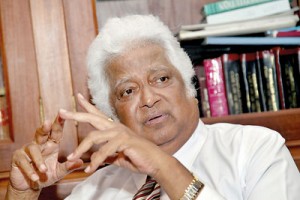News
Focus on rapidly evolving issues such as human rights, environment and digital technology
By the end of this month, several legal personalities in the South Asian region, including Chief Justices (CJ), Lawyers and academics will gather in Colombo for the Silver Jubilee Conference of SAARC LAW, an initiative given birth 25 years ago in Colombo.

SAARCLAW (Sri Lanka) President Nihal Jayamanne
The three-day conference from Oct.27-29 at the Taj Samudra Hotel, titled “Emerging Legal Trends in the South Asian Association for Regional Cooperation (SAARC) countries”, will be an opportunity for those interested in the development of law within the region.
“We are truly happy to host this year’s conference, in its silver jubilee year, in Colombo where the idea for such a body was initially conceived and the first ever conference inaugurated,” SAARCLAW (Sri Lanka) President Nihal Jayamanne P.C. told the Sunday Times.
In 1991, some 175 members of the legal community including judges, legal practitioners and academics of South Asian countries gathered in Colombo to sign the SAARCLAW Charter. Organised by the Bar Association of Sri Lanka, the maiden SAARCLAW conference was held on the same day and inaugurated by the then President R. Premadasa.
As SAARCLAW celebrates its 25th anniversary in the country of its birth, Mr Jayamanne said that, in his view, this body had become the exclusive club of judges and lawyers from the region to meet and discuss issues of mutual interest with shared learning in the fields of law reforms, law enforcement, justice administration, good governance and social justice.
“This could be a common regional platform where knowledge and experience can be gained and shared by looking at regional issues, and later incorporated into our domestic laws if necessary,” he said, while explaining that this year’s topics for discussion are in keeping with contemporary, rapidly evolving issues such as human rights, environment and digital technology.
Stressing that SAARC, as a regional body, lacks teeth, unlike the European Union (EU), ASEAN or other regional groupings, Mr. Jayamanne pointed out that one of the urgent issues which needs to be addressed at regional level is climate change, which member countries should take a collective initiative to combat.
Significantly, one of the topics to be discussed would be focus on forming ‘a common regional platform for combating climate change, environmental degradation, depletion of habitat, decimation of wildlife and deforestation’. Participants will exchange knowledge on issues faced at ‘home’, and come up with legal mechanisms to address these issues.
“This could be an important topic at the conference, as we have yet to formulate legislation to combat climate change and address issues such as waste management and deforestation in our country,” Mr Jayamanne said.
With the SAARCLAW conference under way, the Chief Justices’ Conference of member countries, will be held simultaneously, as a closed-door event. This meeting, which has become an integral part of the SAARCLAW Conference, will provide exclusive space for chief justices to deliberate on issues of relevance to the judiciaries of their respective countries.
The SAARCLAW is also working to create a platform for the Attorney Generals and justice ministers of South Asia.
Another important aspect of this year’s conference would be discussions to draft trade and commercial laws exclusive for the region.
It has been debating the necessity to harmonise some laws to promote greater regional cooperation.
On day 2 of the conference, the participants will explore avenues to promote foreign direct investment and cross-border transactions in the region through the introduction of an investment-friendly legal regime.

